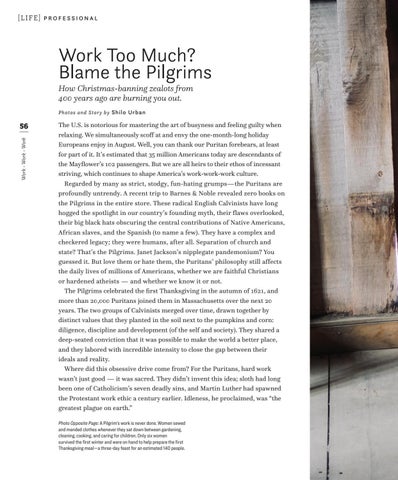[L I F E] P R O F E S S I O N A L
Work Too Much? Blame the Pilgrims How Christmas-banning zealots from 400 years ago are burning you out. Photos and Story by Shilo Urban
Work - Work - Work
56
The U.S. is notorious for mastering the art of busyness and feeling guilty when relaxing. We simultaneously scoff at and envy the one-month-long holiday Europeans enjoy in August. Well, you can thank our Puritan forebears, at least for part of it. It’s estimated that 35 million Americans today are descendants of the Mayflower’s 102 passengers. But we are all heirs to their ethos of incessant striving, which continues to shape America’s work-work-work culture. Regarded by many as strict, stodgy, fun-hating grumps—the Puritans are profoundly untrendy. A recent trip to Barnes & Noble revealed zero books on the Pilgrims in the entire store. These radical English Calvinists have long hogged the spotlight in our country’s founding myth, their flaws overlooked, their big black hats obscuring the central contributions of Native Americans, African slaves, and the Spanish (to name a few). They have a complex and checkered legacy; they were humans, after all. Separation of church and state? That’s the Pilgrims. Janet Jackson’s nipplegate pandemonium? You guessed it. But love them or hate them, the Puritans’ philosophy still affects the daily lives of millions of Americans, whether we are faithful Christians or hardened atheists — and whether we know it or not. The Pilgrims celebrated the first Thanksgiving in the autumn of 1621, and more than 20,000 Puritans joined them in Massachusetts over the next 20 years. The two groups of Calvinists merged over time, drawn together by distinct values that they planted in the soil next to the pumpkins and corn: diligence, discipline and development (of the self and society). They shared a deep-seated conviction that it was possible to make the world a better place, and they labored with incredible intensity to close the gap between their ideals and reality. Where did this obsessive drive come from? For the Puritans, hard work wasn’t just good — it was sacred. They didn’t invent this idea; sloth had long been one of Catholicism’s seven deadly sins, and Martin Luther had spawned the Protestant work ethic a century earlier. Idleness, he proclaimed, was “the greatest plague on earth.” Photo Opposite Page: A Pilgrim’s work is never done. Women sewed and mended clothes whenever they sat down between gardening, cleaning, cooking, and caring for children. Only six women survived the first winter and were on hand to help prepare the first Thanksgiving meal—a three-day feast for an estimated 140 people.









